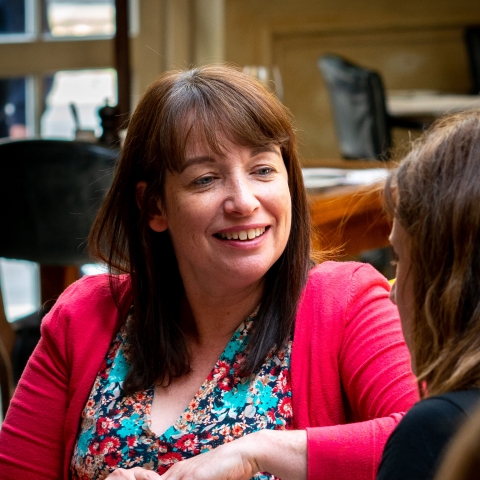


Grants

Realising a New Economy
We believe that the way our economy operates causes many of the problems that we face in society, but it does not have to be this way. We have a vision for a better economy that will serve society and planet instead of extracting from it.
Since we were established we have focused on money, the economy and how they link to society. We believe we need to take a systems change approach to the economy, challenging the structures, power dynamics and beliefs that keep it operating as it currently does.

Our funding priorities
We offer grant funding to support projects and organisations, who are working to shape a fairer, more sustainable economy.
The challenges are vast. The financial system dominates our economy and too often serves its own interests. Meanwhile climate breakdown and inequality continue to worsen. There is no shortage of ideas in the UK for how to change this: we have a wealth of evidence, intelligence and ideas about how to start improving things.
But there are obstacles to these ideas taking root. Our current grants programme is designed to explore some of these by:
-
-
-
- Changing how people understand and think about the economy
- Redesigning the UK’s financial infrastructure
- Supporting organisations driving systemic economic change
-
-
Our Funding Strands 2024-2027
1. Shifting cultural perceptions - this strand is now closed for applications
Exploring how we understand and think about the economy and how we might imagine ways to change it
We believe that the way we collectively think and talk about the economy is a barrier to our ability to see how it could be changed. The economy is often referred to as if it were a natural force – complex, unchangeable and beyond our control. It is also spoken of as if economics were a science that only a few highly educated individuals can truly understand. This makes us feel as though it is too big and too complicated to substantially change, all we can do is tinker with parts of it. You can learn more about our thinking on this by reading our discussion piece.
In this strand we seek to explore a central question ‘how we can begin to shift perceptions and beliefs about the economy, about what it is and what it could be?’ The aim is to focus on how we can promote the idea that economic change is possible.
This was a one-off open call for funding through which we recruited seven organisations with whom we will work on this challenge over the next three years. At the end of the three years we hope to have generated shared learning and experiences that can further push our thinking on how to set the scene for meaningful economic systems change.
The organisations funded under this strand are:
- Client Earth – The laws of economics are not what you think they are: exposing what is to create what should be
This work explores how the legal system can create and reinforce cultural norms, applying Client Earth’s expertise to explore how deep legal codes shape, disseminate and enforce the dominant perception of what the economy is and does. It will also explore how legal systems block new ways of thinking about the economy.
- Heard Organisation – Exploring how a narrative change approach can shift cultural perceptions of our economy.
This project seeks to connect the lived experience of those most impacted by the economic system with mass audiences via relationships with producers of mainstream media & culture (e.g. news, non-news based TV (e.g. soaps, dramas), music and film) – to create stories that change hearts and minds. They are seeking to change the narrative around the economy through their understanding of how to frame communications, their focus on centering lived experience and their connections and networks with mainstream media outlets.
- Impact Investment Institute – Changing the narrative: rethinking capital markets for systemic change
This project builds on baseline research conducted by the Institute to understand the mental models of investment professionals, to build narratives around their role in the economy and to communicate these to key audiences. The aim is to help create mindsets that will enable change – allowing an exploration of how capital market actors can play a role in creating the conditions for change, crafting new narratives about the role of investors in the economy and communicating these widely.
- New Economics Foundation – Understanding the deep-rooted appeal of austerity to the British public, and how to beat it
In this project NEF will work with psychologists and anthropologists to understand and challenge the ongoing dominance of the austerity narrative despite hard evidence of its negative impacts. The project seeks to not just understand what public opinion is but why it is what it is. How is it moderated by cultures, beliefs, mores and ideas? Why are we willing to accept harms in pursuit of abstract economic goals ? This new understanding will allow NEF to build and test new messages to push for the economic policies needed for good public services and net zero.
- Poverty Truth Network – Economics for all
This project seeks to ensure that those who experience the sharp end of economic failures are the heart of its reimagining, via the existing Poverty Truth Commission framework. This will involve Economics for All days across the UK, annual residentials in all four nations of the UK, online events and learning days – all of which will be centred around the lived experience of poverty. These will be used to identify key messages that highlight the inadequacies of the current system and develop a case for alternatives.
- Rethinking Economics – Building an influencer community to reclaim the ‘not enough money for people & planet
This project seeks to broaden the range of voices and perspectives heard on the economy and challenge dominant economic narratives. It will work to influence social media narratives on the ‘lack of money for people and planet’. Rethinking will work with a community of influencers and provide training on climate and economics to equip them with knowledge and tools to communicate complex economic ideas effectively.
- The Equality Trust – Collaborative systems change: imagining and achieving a diversified and democratic functional future
This project seeks to shift power of those most impacted by the injustices of the economic system -using a community reporting methodology to give voice to their stories and experiences and connect those to the wider economic change ecosystem and to those with the power to make change. The ultimate goal is for an economy that ‘supports life and joy’ – where wealth, resource and power isn’t concentrated in the hands of a small few.
Transforming financial systems - open until September 2027
Examining the way the financial system operates at the heart of our economy. The financial system is complex, opaque and difficult to understand. This strand aims to expose the hidden systems (or ‘wiring’) that underpin our economy and explore how it can be transformed.
Ideally the financial system allocates available resources to meet economic and social needs. In practice however it often prioritises self-interest and operates in ways increasingly disconnected from the ‘real economy’ where production, purchase and the flow of goods and services takes place.
Through this programme of work, we are seeking explore barriers and blockages to the creation of a fair and sustainable financial system within the system itself, such as regulations, policy ideas, power dynamics and cultures.
Funding will be granted in three main areas:
- Government Policy and Regulation – including areas such as countering lobbying and influencing; improving the understanding of key decision makers, a renewed focus on public interest.
- Banking – areas of interest include: the role of the Bank of England and Treasury; enabling purpose driven banking; countering the influence of the shadow banking sector.
- Investment – funding might include: redefining the incentives and purpose of investment; questioning ownership rights and responsibilities within the financial system and promoting responsibility and impact focus
More detail is available in our discussion piece.
For more information on the sort of funding we offer and what we do and don’t fund see our Grants Criteria, Why We Say No and FAQs.
This strand will be open for applications until September 2027.
New economy infrastructure – opening 26th May 2025
Supporting organisations that are central to our mission of economic systems change to create a stronger, responsive sector able to challenge entrenched economic norms.
The UK has historically championed neoliberal economics, yet it is also home to a vibrant community of new economic thought and practice. While interest in economic systems change is growing in the UK, the infrastructure supporting this work remains weak. Many of the organisations driving this agenda are underfunded, and overstretched.
The UK’s new economy organisations often lack the stable, flexible support required to build long-term capacity, collaborate effectively, and scale their impact. If they are to evolve into enduring, influential institutions capable of shaping mainstream debates and policies, they need flexible core support.
This strand is designed to support key or anchor organisations that are central to the infrastructure of the new economy movement and have the potential to drive systemic change.
We are looking to support organisations that:
- Demonstrate strong strategic alignment with the mission and funding priorities of Friends Provident Foundation.
- Have an explicit primary focus on economic systems change: that is organisations whose core work is about rethinking and reshaping economic structures, rather than those working primarily in other policy areas (such as food, energy, or skills) that intersect with economic themes.
- Offer a compelling, long-term vision for a fairer, more sustainable economy.
- Work systemically and at root-cause level. We support efforts that address the deeper structural drivers of inequality and unsustainability and move beyond the short term thinking that has caused many of the issues we face.
- Demonstrate contextual awareness and a collaborative, intersectional approach. We want to work with organisations that see their role within a broader ecosystem and engage in building bridges across sectors, disciplines, and communities.
More detail is available in our overview document.
For more information on the sort of funding we offer and what we do and don’t fund see our Grants Criteria, Why we Say No and FAQs.
This strand will be open for applications until September 2027.

Grants criteria
Find out whether your project, fund or organisation is eligible for one of our grants.

How to Apply
We operate a two-stage application process – our intention is that this allows you to test your ideas with us before committing to writing a full application.
FAQs
I am not based in the UK – can I apply?
We can only fund activity focused on the UK. Your organisation doesn’t necessarily have to be based in the UK but the work you are doing needs to be clearly focused on the UK economy.
Do I have to be a charity to apply?
You do not have to be a charity to apply – we will fund any sort of organisation as long the work you’re asking us to support is charitable in its nature. This means that it should have what is formally recognised in the UK as a charitable purpose. You can find more information on this here: https://www.gov.uk/government/publications/charitable-purposes/charitable-purposes
My organisation isn’t formally constituted – can I apply?
Yes, as long as the nature of your activity is a fit with our programme and charitable in its nature you can apply. We ask that you are hosted either by another constituted partner or by a fiscal hosting organisation. We can support you in looking into this as part of the application process.
I already have a grant – can I have another?
Unless we specify that a special call is open to all, organisations can only hold one grant with us at a time to enable us to offer our resources out to as many relevant groups as possible. Please think carefully about which strand of funding is the most relevant to you.
You can of course apply for continuation funding during the lifetime of a grant. If your current grant is due to end in the next year then be aware of our funding timelines and build in sufficient time to reapply for further funding.
I was recently declined for funding – can I reapply?
Yes, we do not place any restrictions on how many times you apply. If you are reapplying for the same work, please make sure you have taken account of the feedback you have received for previous applications.
What are my chances of getting funding?
Every year we receive far more applications than we can support. Last year the rate of stage one applicants successfully reaching stage two of the process was 8%. For stage two applicants the funding rate was 60%. This year we will be changing our stage one application process to try to help applicants better understand if we are the right funder for them.
How long will it take to get a decision?
From your initial contact with us until the final decision to fund takes around six months. Those declined at stage one will find out in about 3 months.
What costs will your funding cover?
We will cover all and any costs associated with your work– we are a full cost recovery funder and recognise the need for organisations to seek funds to support their organisational capacity and to build healthy reserves.
Can we use your funding as match funding?
Our funding budgets are always oversubscribed and we are often unable to meet the full costs of a project or activity. We fully encourage match funding and are happy to cooperate with other funders to support you. This is not a requirement but is something we see as a positive approach.
What kind of funding do you offer?
Our default position is to award unrestricted grants – a contribution to the work of an organisation or institution – if we believe that their general work aligns with our aims. On occasion we may have to offer a more restricted grant for a particular theme of work or project. Our programme staff will work through each application and explain this during the process.
How much can I apply for?
Our average grant is in the region of £100-120k over two years. We are open to approaches for more but please bear in mind that we can never fully satisfy the demand for our funding and are less likely to be able to award this. We will discuss budget requests with you during the stage 1 application process.
Eligibility Quiz
Our eligibility quiz will help you find out if you’re able to apply to our fund. Please also check our FAQs and grants criteria.
If you are interested in our funding please get in contact to find out more.
Please use our Say Hello function to get in touch.

What to expect from us
We aim to provide a fair and transparent application process. We are open to discussions before you apply and always offer feedback. Our team work in partnership with successful grant holders to provide funding in a tailored way to each partner organisation and support full cost recovery principles.

Projects we’ve funded
We have provided funding for a number of innovative ideas and practical projects, all of which work towards shaping a future economy that works for all.
Meet the grants team

Abigail Gibson
she/her
Head of Funding Strategy
Pronouns
Name Lastname
Role
Lorem ipsum dolor sit amet, consectetur adipiscing elit. Nunc vulputate libero et velit interdum, ac aliquet odio mattis. Class aptent taciti sociosqu ad litora torquent per conubia nostra, per inceptos himenaeos. Lorem ipsum dolor sit amet, consectetur adipiscing elit. Nunc vulputate libero et velit interdum, ac aliquet odio mattis. Class aptent taciti sociosqu ad litora torquent per conubia nostra, per inceptos himenaeos.